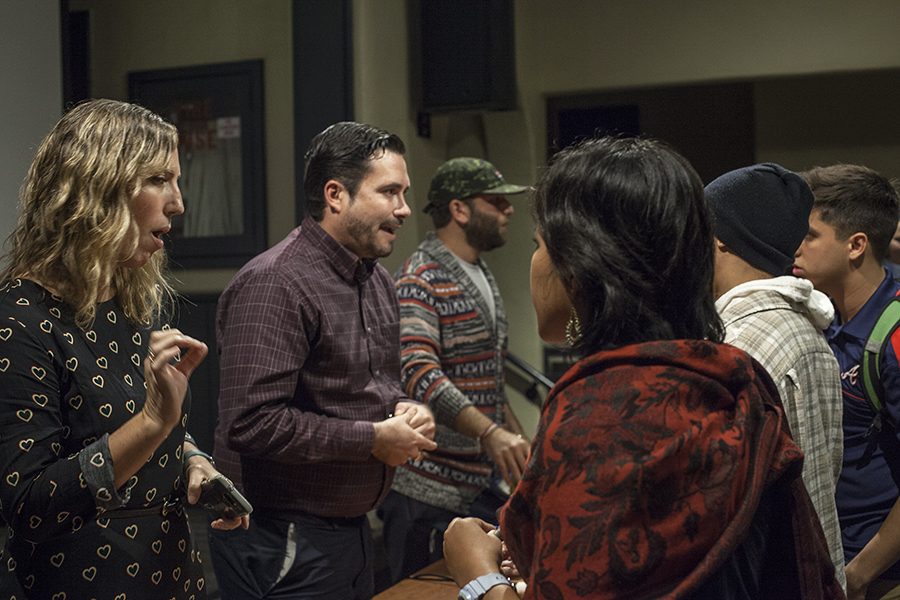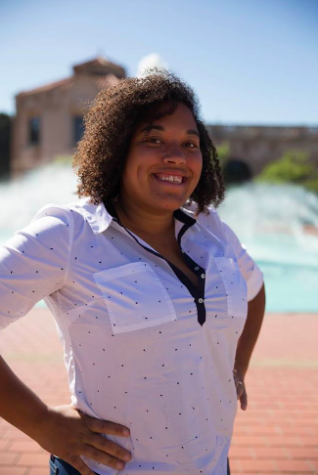Local business, college and government leaders spoke to a full room at San Diego State’s Scripps Cottage to advise students planning to work in the field of sustainability during a panel on Nov. 7.
Organized by the E3 Enviro-Business Society and sponsored by Greenfest, the panelists shared their experiences in the field.
Climate action plans for both the City of San Diego and SDSU were both discussed throughout the panel.
Chief Sustainability Officer Cody Hooven said the City of San Diego aims to have a 100 percent renewable energy grid and zero-waste trash system by 2040. The city also has a goal of over 50 percent of commuters using bicycles or public transit, rather than driving.
“One of my aspirations is getting 100 percent energy fully passed so that we all benefit from that,” she said. “That spurs business, that spurs the economy, that spurs job growth; it’s not just about hugging the trees and saving the Earth.”
Increased risks of drought, rainfall, flooding risks, rising sea levels, high heat days and wildfires due to climate change are some of the issues that Hooven said the city is looking to prevent or alleviate through its sustainability plan.
SDSU Facilities Assistant Director for Sustainability Tom Abram discussed the university’s plans for sustainability, which he said includes increases in the number of solar panels, possible campaigns to reduce the number of single occupancy vehicles that students take to campus and a new California State University program to automatically substitute office supplies for sustainable alternatives when ordered through Staples.
Ian Bevan, a 2008 SDSU graduate and sustainability consultant with EcoNomics, inc., advocated for inclusivity in the sustainability movement. He described a program where the Environmental Protection Agency gave grants for businesses to go through a green business certification program and said that similar programs would improve equity in sustainable businesses.
“We haven’t done a great job of reaching out to everybody and being inclusive to disadvantaged communities,” Bevan said. “We got to work with all these industries that don’t normally get to go through our process because the EPA gave us $600 for each business to kind of level the playing field there. More steps like that need to be taken because so much of the Central Valley, so much of Southern California is, to some degree, being left out.”
Jonathan Zaidman, another 2008 graduate of SDSU, discussed some of the challenges of working for a non-profit like The Ecology Center, where he is the director for regional expansion. One of the biggest issues for nonprofit organizations is the constant search for grants to support programming and operations, he said.
“One of the biggest challenges as a nonprofit organization is you’re essentially always chasing funding,” Zaidman said. “It’s not a sustainable line of business in that it relies, almost exclusively, on philanthropy.”
During his time at SDSU, Zaidman said he worked to have a bike lane built on the campus.
Sustainability is an important aspect of growing a successful business, said panelist Dana Arnold, chief operating officer of Measurabl, a sustainability and energy management software company. She said that more and more, sustainability is being taken seriously by a wide audience of business owners.
“When it comes to sustainability and business and why it’s important, it’s something that’s extremely important if you look at what climate change is really doing to affect our people and our business community,” Arnold said. “When you look at hurricanes that have destroyed good parts of cities, building owners and operators are looking at that as a huge risk to their business. When there are hurricanes that are coming and destroying their property, there is a huge amount of capital investment that needs to go in to rebuild those cities.”
San Diego currently has more than 30,000 jobs in about 1,000 local, sustainable businesses, according to Cleantech San Diego President Shannon Casey. She said that anyone seeking a job in the sustainable business industry doesn’t necessarily need to be an expert, but they need to be ready to learn.
“You don’t have to know Excel to be an intern,” Casey said. “In case anyone is out there thinking ‘Oh no, this is an uphill battle,’ there are absolutely ways in if you are persistent, and genuine and passionate.”









